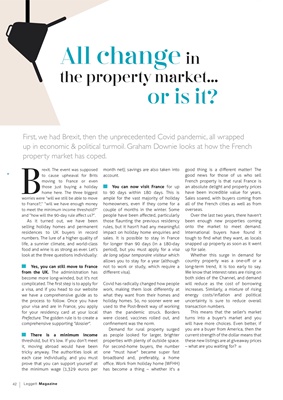
42 Leggett Magazine
First, we had Brexit, then the unprecedented Covid pandemic, all wrapped
up in economic & political turmoil. Graham Downie looks at how the French
property market has coped.
month net); savings are also taken into
account.
You can now visit France for up
to 90 days within 180 days. This is
ample for the vast majority of holiday
homeowners, even if they come for a
couple of months in the winter. Some
people have been aff ected, particularly
those fl aunting the previous residency
rules, but it hasn't had any meaningful
impact on holiday home enquiries and
sales. It is possible to stay in France
for longer than 90 days (in a 180-day
period), but you must apply for a visa
de long séjour temporaire visiteur which
allows you to stay for a year (although
not to work or study, which require a
diff erent visa).
Covid has radically changed how people
work, making them look diff erently at
what they want from their homes and
holiday homes. So, no sooner were we
used to the Post-Brexit way of working
than the pandemic struck. Borders
were closed, vaccines rolled out, and
confi nement was the norm.
Demand for rural property surged
as people looked for larger, brighter
properties with plenty of outside space.
For second-home buyers, the number
one "must have" became super fast
broadband and, preferably, a home
offi ce. Work from holiday home (WFHH)
has become a thing - whether it's a good thing is a diff erent matter! The
good news for those of us who sell
French property is that rural France is
an absolute delight and property prices
have been incredible value for years.
Sales soared, with buyers coming from
all of the French cities as well as from
overseas.
Over the last two years, there haven't
been enough new properties coming
onto the market to meet demand.
International buyers have found it
tough to fi nd what they want, as locals
snapped up property as soon as it went
up for sale.
Whether this surge in demand for
country property was a one-off or a
long-term trend, it is too early to say.
We know that interest rates are rising on
both sides of the Channel, and demand
will reduce as the cost of borrowing
increases. Similarly, a mixture of rising
energy costs/infl ation and political
uncertainty is sure to reduce overall
transaction numbers.
This means that the seller's market
turns into a buyer's market and you
will have more choices. Even better, if
you are a buyer from America, then the
current strength of the dollar means that
these new listings are at giveaway prices
- what are you waiting for?
B
rexit. The event was supposed
to cause upheaval for Brits
moving to France or even
those just buying a holiday
home here. The three biggest
worries were "will we still be able to move
to France?," "will we have enough money
to meet the minimum income threshold?"
and "how will the 90-day rule aff ect us?".
As it turned out, we have been
selling holiday homes and permanent
residences to UK buyers in record
numbers. The lure of a higher quality of
life, a sunnier climate, and world-class
food and wine is as strong as ever. Let's
look at the three questions individually:
Yes, you can still move to France
from the UK. The administration has
become more long-winded, but it's not
complicated. The fi rst step is to apply for
a visa, and if you head to our website
we have a comprehensive guide as to
the process to follow. Once you have
your visa and are in France, you apply
for your residency card at your local
Prefecture. The golden rule is to create a
comprehensive supporting "dossier".
There is a minimum income
threshold, but it's low. If you don't meet
it, moving abroad would have been
tricky anyway. The authorities look at
each case individually, and you must
prove that you can support yourself at
the minimum wage (1,329 euros per
All change in
the property market...
or is it?